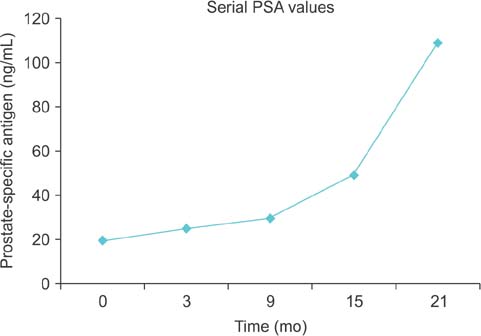Korean J Urol.
2015 Nov;56(11):785-787. 10.4111/kju.2015.56.11.785.
Repeated spurious elevation of serum prostate-specific antigen values solved by chemiluminescence analysis: A possible interference by heterophilic antibodies
- Affiliations
-
- 1Urology Department, Institut Catala dUrologia i Nefrologia, Barcelona, Spain. arturodom1980@hotmail.com
- 2Laboratori d'analisis M. Bayo, Terrassa, Spain.
- KMID: 2351043
- DOI: http://doi.org/10.4111/kju.2015.56.11.785
Abstract
- Heterophilic antibodies are human immunoglobulins directed against various animal antigens. They can produce false-positive results in the analysis of different tumor markers, including prostate-specific antigen. This interference can lead to misdiagnosis, unnecessary tests, and overtreatment in some cases. We present herein the case of a 52-year-old man with repeated spurious elevation of prostate-specific antigen, reaching levels of 108.7 ng/mL, that were suspected to be caused by heterophilic antibodies. The interference was solved by changing the analysis technique. Real values of prostate-specific antigen were less than 1 ng/mL.
MeSH Terms
Figure
Reference
-
1. Levinson SS, Miller JJ. Towards a better understanding of heterophile (and the like) antibody interference with modern immunoassays. Clin Chim Acta. 2002; 325:1–15.2. Weber TH, Kapyaho KI, Tanner P. Endogenous interference in immunoassays in clinical chemistry: a review. Scand J Clin Lab Invest Suppl. 1990; 201:77–82.3. Kricka LJ, Schmerfeld-Pruss D, Senior M, Goodman DB, Kaladas P. Interference by human anti-mouse antibody in two-site immunoassays. Clin Chem. 1990; 36:892–894.4. Camacho T, Mora J, Segura A, Guitian J, Lema F, Bandín J, et al. Falsely increased prostate-specific antigen concentration attributed to heterophilic antibodies. Ann Clin Biochem. 2002; 39(Pt 2):160–161.5. Henry N, Sebe P, Cussenot O. Inappropriate treatment of prostate cancer caused by heterophilic antibody interference. Nat Clin Pract Urol. 2009; 6:164–167.6. Fritz BE, Hauke RJ, Stickle DF. New onset of heterophilic antibody interference in prostate-specific antigen measurement occurring during the period of post-prostatectomy prostate-specific antigen monitoring. Ann Clin Biochem. 2009; 46(Pt 3):253–256.7. Park S, Wians FH Jr, Cadeddu JA. Spurious prostate-specific antigen (PSA) recurrence after radical prostatectomy: interference by human antimouse heterophile antibodies. Int J Urol. 2007; 14:251–253.8. Morgan BR, Tarter TH. Serum heterophile antibodies interfere with prostate specific antigen test and result in over treatment in a patient with prostate cancer. J Urol. 2001; 166:2311–2312.9. Kummar S, Shafi NQ. False elevations in prostate-specific antigen levels affecting patient management. Clin Adv Hematol Oncol. 2004; 2:599–601.10. Poyet C, Hof D, Sulser T, Muntener M. Artificial prostate-specific antigen persistence after radical prostatectomy. J Clin Oncol. 2012; 30:e62–e63.
- Full Text Links
- Actions
-
Cited
- CITED
-
- Close
- Share
- Similar articles
-
- Change of serum prostate specific antigen values after radiation therapy in prostate cancer
- The Factors Influencing the Percentage of Free Serum Prostate Specific Antigen Levels in Men without Clinically Detectable Prostate Cance
- Change of PSA and PSAD after Antibiotic Treatment in Patients with Prostatitis
- The Diagnostic Value of Prostate-specific Antigen and the of Routine Laboratory Examination for Early Detection
- Usefulness of Rapid PSA Kit(R)


